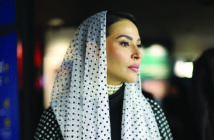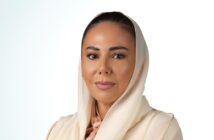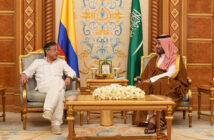
By ALEXANDER WOODMAN
What are the main factors leading to such a strong strategic partnership between the Saudi Arabia and the United States, spanning over eight decades?
The strategic partnership between the U.S. and Saudi Arabia that was forged during the historic meeting between King Abdulaziz and President Franklin Roosevelt aboard the U.S.S. Quincy 75 years ago has brought the Saudi and American people closer together in an ever-expanding list of shared successes. From security, to energy, to education, to countering terrorism, Americans and Saudis together have contributed to the expansion of the global economy and ensuring the security and stability of the region. During the Cold War, we stood together against Communism and Soviet aggression. In 1991, our joint forces liberated Kuwait. We have stood shoulder to shoulder to counter the threat of terrorism. Our citizens have learned from one another through a rich slate of exchange programs. Hundreds of thousands of Saudis have visited, studied, and worked in the United States. Thanks to Saudi Arabia’s new visa regulations, more Americans will have the ability to travel to Saudi Arabia as business representatives, thought leaders, tourists, scholars, artists, athletes, and competitors.
In 1943, the first U.S. mission to Saudi Arabia started its history in Jeddah. What are the responsibilities of the U.S. Consulate General in Jeddah in the 21st century?
The Consulate General in Jeddah represents and protects U.S. interests in the entire Western region of Saudi Arabia. Our Consular district includes seven governorates: Tabuk, Madina, Makkah, Asir, Al Baha, Jizan and Najran. As Consul General, I am the representative of the U.S. Ambassador to Saudi Arabia to this region and concurrently serve as the U.S. Representative to the Organization for Islamic Cooperation (OIC) in Jeddah. Consulates operate like little embassies. While processing visa applications is the first thing that comes to mind when the U.S. Embassy or Consulate is mentioned, it is just one of many services they provide as a diplomatic mission. We provide consular services, conduct public outreach, organize educational and cultural programming, advise Saudi students looking to pursue their studies in the United States, promote commerce with the U.S., and meet with government officials and business leaders throughout the region.
What is the significance of the Western province? How does it differ from Central or Eastern provinces?
The Western region of Saudi Arabia has great religious significance to Muslims around the world, including the United States, as home to Mecca and Medina, and the Two Holy Mosques. We work a great deal with the Ministry of Hajj to ensure that pilgrims from the United States are able to safely travel to Saudi Arabia for the Hajj and Umrah. Jeddah is also home to the Organization of Islamic Cooperation, and the team at the Consulate and I officially represent the United States at the OIC.
As the Kingdom’s largest port city, Jeddah has a long history in trade and culture, as the gateway to Mecca. Today, Jeddah is evolving into a cosmopolitan city where visitors can easily access the Red Sea.
Western Saudi Arabia has so much diversity or opportunity, from the mountains, to the deserts, to the coastal regions. The region also is home to three giga-projects under Vision 2030 – Neom, the Red Sea Project, and Amaala – all of which are great avenues for increasing partnerships between Saudi and American businesses. In fact, we see partnership possibilities throughout the region in many areas, like tourism, logistics, and manufacturing.
This is your second assignment in Jeddah. Can you discuss changes you have witnessed upon arrival to the Kingdom almost two decades later?
Returning to a place after so much time had passed – almost 15 years – has been a very interesting experience. At first you notice all the changes – in Jeddah, the city has almost doubled in size since I left in 2004. I used to drive to Obhur and think about how long a drive that was, but now it seems Jeddah extends past Obhur. There are so many more restaurants and entertainment options now. These are all exciting developments. But some things never change, even after 15 years. The weather is the same, and the feel of the air here on the Red Sea reminds me of my walks on the Corniche from 2002-2004. And most importantly, the hospitality and friendliness of the people have not changed. I feel just as welcome now as I did when I first came to Jeddah.
Recently, the U.S.-Saudi Business Council, a member of the B20 Trade and Investment Task Force, participated in a virtual plenary meeting on issues related to COVID-19. Elaborate please.
Since the outbreak of COVID-19, the U.S. Government has committed more than $1 billion in State Department and U.S. Agency for International Development (USAID) emergency health, humanitarian, economic, and development assistance specifically aimed at helping governments, international organizations, and non-governmental organizations (NGOs) fight the pandemic. Our team at the U.S. Consulate in Jeddah appreciates the close collaboration of the Saudi government, the public and private sectors and with our friends, the Saudi people to help defeat COVID-19.
STEAM – Science, Technology, Engineering, Art, and Mathematics – is the theme of the 2020 Saudi Young Leaders Exchange Program. What are the main goals of this initiative?
We offer many youth-oriented programs, such as the Saudi Youth Leadership Exchange Program (SYLEP). We send dozens of Saudis to the U.S. on professional, academic and cultural exchange programs to gain meaningful experience with their American counterparts as well as to develop leadership skills and personal development. Our goal for exchange programs is to capture the diversity of Saudi Arabia and, of course, Saudi Arabia is more than just its major cities. SYLEP is open to Saudi undergraduate students or recently graduated university students between the ages of 21-26.
I encourage you to follow us on social media to get the latest information about our exchange programs, news, and events.
U.S. Consulate General Jeddah
Twitter: @USAinjeddah
Facebook: @USConsulateGeneralJeddah
Instagram: @USConGenJeddah



